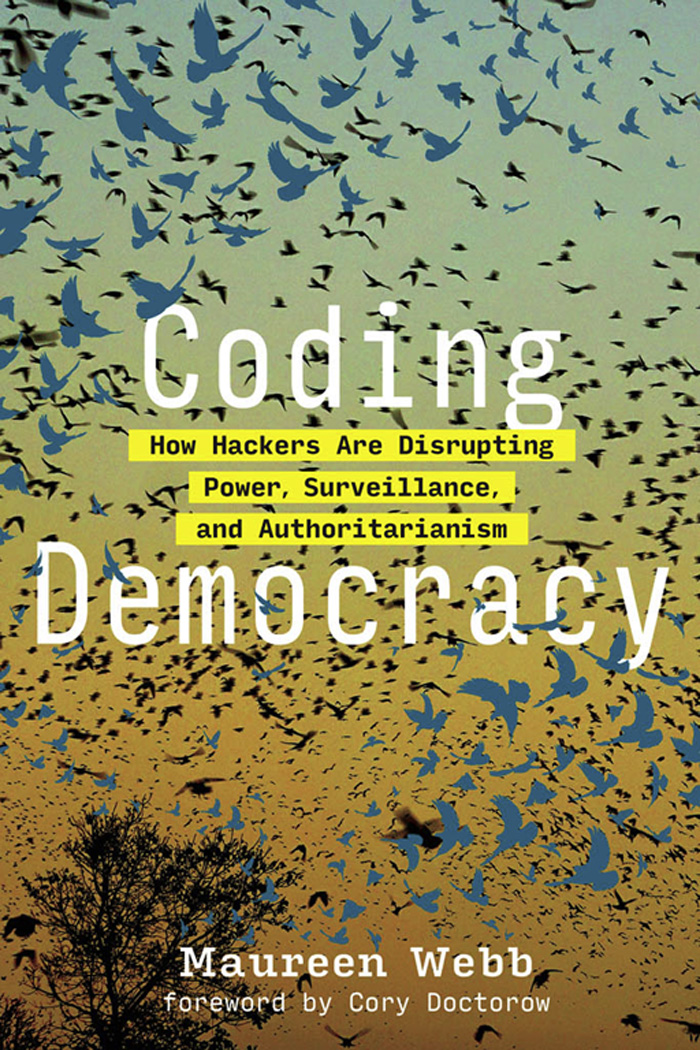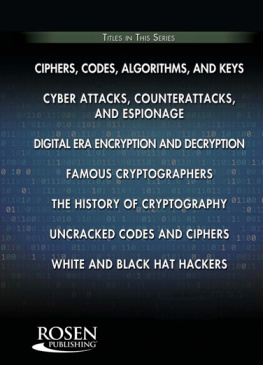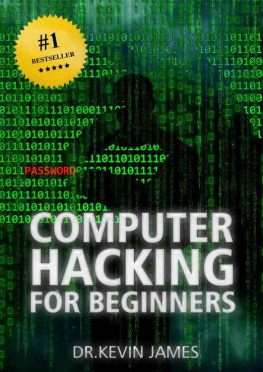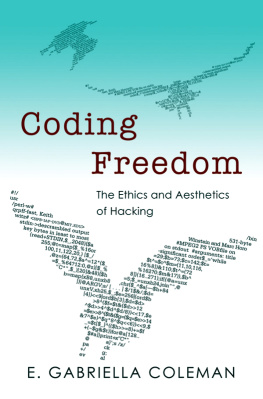
Coding Democracy
Coding Democracy
How Hackers Are Disrupting Power, Surveillance, and Authoritarianism
Maureen Webb
Foreword by Cory Doctorow
The MIT Press Cambridge, Massachusetts London, England
2020 Maureen Webb
All rights reserved. No part of this book may be reproduced in any form by any electronic or mechanical means (including photocopying, recording, or information storage and retrieval) without permission in writing from the publisher.
This book was set in ITC Stone and Avenir by Toppan Best-set Premedia Limited.
Library of Congress Cataloging-in-Publication Data
Names: Webb, Maureen, author. | Doctorow, Cory, writer of foreword.
Title: Coding democracy : how hackers are disrupting power, surveillance, and authoritarianism / Maureen Webb.
Description: Cambridge, MA : MIT Press, [2020] | Includes bibliographical
references and index.
Identifiers: LCCN 2019018826 | ISBN 9780262043557 (hardcover : alk. paper)
Subjects: LCSH: Hacktivism. | Cyberspace--Political aspects. |
Internet--Social aspects. | Hacktivism. | Computer security. |
Internet--Social aspects. | Democratization.
Classification: LCC HV6773 .W427 2020 | DDC 364.16/8--dc23 LC record available at https://lccn.loc.gov/2019018826
10 9 8 7 6 5 4 3 2 1
To those in precarious situations
Contents
Foreword: There Are Two Kinds of People
Cory Doctorow
When youre small, youre taught that there are two kinds of people:
- 1.good ones, and
- 2.bad ones.
As you get older, if youre lucky enough to have the right kinds of teachers and the right opportunities for learning, you realize that there are indeed two kinds of people:
- 1.people who think there are two kinds of people (good ones and bad ones), and
- 2.people who think that people are pretty much a mixed bag, prone to venality and capable of nobility, fallible and self-deceiving; and that the goodness or badness of a person from moment to moment has more to do with the structures we build to act as a check on fallibility than it does with the intrinsic virtues or wickedness of any one of us.
The name for the systems we build to elevate virtue and check vice is politics, and, practiced correctly, it can produce a sum that is greater than the whole of its parts: a superhuman machine capable of superhuman feats. Literally: welding together more than one person to accomplish a common end enables outcomes that are more than one person could ever hope for. Superhuman.
For a quarter-century, dreamers, theorists, schemers, builders, optimists, pessimists, crackpots, and geniuses have run a series of experiments in connecting people using networked computers, experimenting with governance structures (ICANN, github, Unix file permissions, standards development organizations, Reddit upvotes, statutes, treaties, regulations), normative frameworks (manifesti, terms of service, moderator guidelines), tools (encryption, error correction, ranking algorithms), and businesses (eBay, Amazon, iTunes, Google Play, the Silk Road), trying to find ways to upregulate desirable behaviors and downregulate the bad ones.
The societal view of this project has been a mess: at first, it was widely dismissed as a distraction, a toy for nerds who believed that somehow their Star Trek message-boards had some political consequence. Then, in a hot second, the outside world pivoted to mock tech activists for their supposed techno-optimism and alleged indifference to the ways in which tech had become a dominant political force in the world.
These two points of viewtech doesnt matter versus tech matters too much to listen to nerdshave one thing in common: theyre both most commonly evinced by people who dont understand tech very well. This is a book that aims to bridge that divide in understanding, and at this political moment thats an important contribution.
I dont mean that critics lack an appreciation of how tech businesses work (although many do), or of the human frailties of technologists themselves (these are often self-evident): I mean that, at a nuts-and-bolts level, they tend not to understand whats going on when they sit in front of a computer and make it do things, or have things done to them. When better-informed activists point out the technical incoherence of some critiques (e.g. Why cant YouTube just use an algorithm to block hate speech?), they are accused of a mulish intransigence dressed up as technical objections. All too often, the answer to thats just not possible, is NERD HARDER!
The thing is, technology activists are, in fact, enthusiastic about technology. They really do believe that with technology, we can create structures that upregulate the angels of our better nature and downregulate the venal, cowardly, and unworthy impulses. If that was all that tech activists believed, then it would be totally fair to call them monsters of hubris, the unwitting handmaidens of technological oppression through ubiquitous surveillance and control.
But thats not all tech activists believe. They believe that everything could be so great but only if we dont screw it up. After all, if youre an information security person, your whole job is to sit around and think of how terrible people will abuse the systems youre charged with protecting. If youre an information security specialist, you have to both love and fear techthe way that a demolitions expert loves and fears dynamite.
The hacker way has its problems: move fast and break things was always self-serving bullshit fronted by overgrown toddlers who wanted to grift their way to millions (billions!) without adult supervision.
But the way hackers do policydeploying deep, hard-won technical expertise to build and modify systems with some real concern for systems societal effects and an approach that reduces how much agreement we need before we can work togetheris admirable. It is animated by a profound understanding of the perils of tech gone wrong as much as by an exuberance at the transformative power of tech.
This is a book about hackers and hacker politics: the nuts-and-bolts and the big picture. The people who appear in it (including, briefly, me) are, like our fellow human beingsdeeply flawed, cracked vessels who struggle to contain bad impulses and to let the pure water of our noble ones pour out freely.
Hacker politics are anti-authoritarian because hackers know that authorities are just as damaged as they are. Hacker politics are pluralistic because hackers know that unchecked power is a catastrophe in the making, because without those checks, the bugs in the system will run wild and brick the device before you even know theres something wrong there. It is a political ethos that accounts for the fallibility of human beings as much as for their unlimited potential. It is designed to avoid making things worse, even if doesnt always know how to make them better.
Hacker politics may not solve our problems, but as this book makes clear, they are going to be part of the solution.
Authors Note
As this book was well into production, in August 2019, a series of allegations began to emerge against a number of people and institutions featured in the text. These allegations linked sex offender Jeffrey Epstein to MIT and to Harvard, and also to faculty and donors at those institutions, including MIT Media Lab Director Joi Ito and MIT professor Marvin Minsky (now deceased). In early September, The New Yorker reported that Ito had accepted numerous donations to the Media Lab from Epstein after the latters conviction in 2008 for soliciting prostitution from a minor, as well as more than $1 million for Itos own personal investments. It alleged that Ito had concealed the donations. Around the same time, the President of MIT, Rafael Reif, admitted that he had approved a donation from Epstein to a University faculty member in 2012 and had signed a thank-you note to him. Marvin Minsky, meanwhile, was accused of sexually exploiting a 17-year-old female (more than 55 years his junior) allegedly trafficked by Epstein.
Next page







